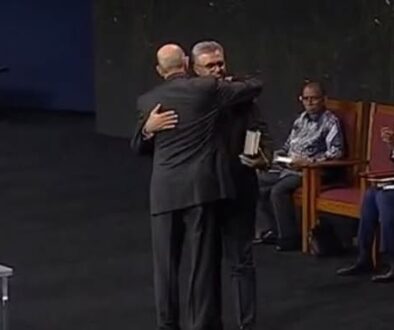Council of Adventist Denominational Leaders to Discuss Sexuality
by Monte Sahlin
An Official Release from the Adventist News Network and Adventist Review, March 17, 2014
Nearly 350 Seventh-day Adventist Church leaders, pastors, academics, and human services experts have gathered in Cape Town, South Africa, for a four-day summit intended to help the worldwide Church better address issues related to homosexuality and alternative sexualities. Around the theme “In God’s Image: Scripture, Sexuality, Society;” the conference at Africa’s southern tip is intended to be “a conversation with key people in the global leadership of the Seventh-day Adventist Church, to gain a greater understanding of the issues surrounding alternative sexualities, and to counsel together regarding the challenges the church is facing in this area,” organizers said.
Each of the denomination’s 13 world divisions has sent a delegation of at least 20 persons composed of senior administrators, theology and social science scholars, and “frontline personnel” (pastors, chaplains, and human resources directors) to the intensive event that began Monday (March 17). The keynote address by Pastor Ted Wilson, president of the General Conference (GC), is titled “The Truth as It Is in Jesus.”
Pastor Pardon Mwansa, a Zambian who is a general vice president of the GC and chair of the committee that organized the summit, believes that the event is a watershed for Adventist discussion of difficult social and religious issues. “We are dealing with an issue about which the world around us has already formed a perception,” Mwansa said. “We can’t avoid dealing with this matter because those perceptions affect how we express ourselves. The Church needs to clarify its light: we must say where we are on this matter, so that people will understand us and how we view this subject. … We are a moral group—a church—and we have to shine and say just what the light is on this issue.“
Mwansa additionally underscored the importance of the Cape Town conference by pointing to the persons attending. “This is a meeting to which all church leadership has been invited, and all will attend,” he noted. “The quality of meetings is generally judged by who attends, and here you have all world division officers attending, along with pastors, teachers and human services personnel. The goal is to make sure that what is done here reflects the corporate thinking of the Church.”
The summit organizers are clear that they intend no redefinition of the Church’s historic opposition to all sexual expression other than heterosexual marriage between one man and one woman. Listed first among the summit’s objectives is the goal to “describe the Bible’s teaching on alternative sexualities.” Two of the conference’s first three plenary sessions focus on how to read and understand the Bible’s teachings about human sexuality, as well as specific passages of both Old and New Testaments that address homosexual behavior.
On Tuesday evening, three Adventists who spent major portions of their adult lives in gay or lesbian relationships will relate their experiences in a plenary session panel. Wayne Blakely, Ron Woolsey and Virna Santos each describe themselves as “redeemed” out of homosexual behaviors, and now lead ministries designed to help others make a similar transition. Woolsey, now for many years in a heterosexual marriage, is also an ordained Adventist minister.
The denomination’s legal and employment concerns with legislation about homosexuality in various nations will be in focus at a Wednesday morning plenary panel moderated by Pastor Lowell Cooper, a GC vice president. Two additional plenary sessions on Wednesday afternoon and evening seek to update the international delegation on the latest understandings of homosexuality and alternative sexualities from the perspectives of medicine and psychology. Dr. Peter Landless, GC director of health ministries, and Dr. Peter Swanson, a licensed psychologist and assistant professor of pastoral care at the theological seminary at Andrews University, will address research findings regarding the possible roles played by genetics and social influences in the formation of alternative sexualities.
On Thursday, the summit will focus on ministry to homosexuals and those practicing alternative sexualities, and discuss how the denomination will relate to church membership for those not following Scriptural teaching about human sexuality. Dr. Miroslav Kis, professor of ethics at Andrews University, will offer an overview of the ethical issues the church must wrestle with at both global and congregational levels as it seeks to be both clear about its loyalty to Bible teaching and compassionate to individuals in various life experiences.



